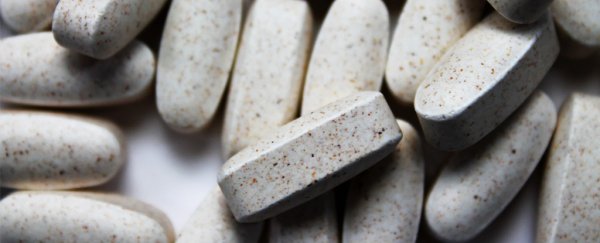While in some countries the vaccine rollout is well underway, many of us still live amidst the risks of the COVID-19 pandemic without protection, and need all the help we can get.
An interesting study by an international team of researchers has now found a small association with supplement use, indicating fewer COVID-19 infections in women who are taking certain types of vitamins. But don't rush to the pharmacy just yet.
Firstly, it's important to remember that the potential merits of multivitamins are extremely limited. Doctors generally advise that most people get enough micronutrients in their diet to keep healthy, and in the past studies on the health benefits of vitamin supplements without a diagnosed deficiency have been a truly mixed bag.
Despite that, in the early days of the pandemic, vitamins were one of the many items that flew off pharmacy shelves.
"The UK supplement market increased by 19.5 percent in the period leading up to the national 'lockdown' in early March 2020, with a 110 percent rise in sales of vitamin C and a 93 percent rise in sales of multivitamin supplements," the team wrote.
"Likewise, zinc supplement sales increased by 415 percent over the 7-day period ending 8 March, at the height of COVID-19 concern in the USA."
Supplements can have a role to play in supporting our health. Zinc is one of the few micronutrients linked with shortening the disease course of the common cold; those on vegan diets are recommended to take B12 vitamins to help combat deficiency. But staving off infections is where it gets tricky.
The researchers took data from an app launched by health science company Zoe back in early 2020 called the 'COVID-19 Symptom Study app', which asked participants a wide range of questions, including whether they used vitamins such as probiotics, garlic, fish oils, multivitamins, vitamin D, vitamin C, or zinc. They also asked if they'd been tested for SARS-CoV-2 and what the results were.
A total of 445,850 subscribers from the UK, US and Sweden had answered the questionnaire before 31 July 2020, giving the team plenty of data to analyze.
In the UK, where the vast majority of those surveyed were based, just under half took some kind of supplement. Around 6 percent of those that took supplements tested positive to SARS-CoV-2, while 6.6 percent of those who didn't take supplements tested positive. That's a difference of around 2,500 people.
"In the UK cohort, users regularly supplementing their diet with multivitamins had a lower risk of testing positive for SARS-CoV-2 by 13 percent, with vitamin D had a lower risk by 9 percent, with probiotics had a lower risk by 14 percent and with omega-3 fatty acids had a lower risk by 12 percent," the researchers wrote.
"There were no significant associations in those supplementing with zinc, vitamin C, or garlic."
There are plenty of caveats here to take note of. Firstly, this is an observational study based on self-reports, which means there is no causal proof that vitamins resulted in fewer COVID-19 diagnoses.
The team adjusted for age, sex, BMI and a number of other factors, and tried to account for 'healthy user bias', which is the idea that those who take vitamins are likely to be healthier in other ways too, which could conflate the results.
Even after all that, the results were still there, but interestingly, once the team had split up the results by sex, for men there was no difference linked to supplements, while in women the results were present across all ages and BMI groups.
The results were also slightly different between the US and Sweden, finding that omega-3 supplements didn't appear to help Swedish women, and probiotics and vitamin D appeared to help US men.
"In the largest observational study on SARS-CoV-2 infection and dietary supplement use to date on over 400,000 app users from three different countries, we show a significant association between users of omega-3 fatty acid, probiotic, multivitamin or vitamin D supplements and lower risk of testing positive for infection with SARS-CoV-2," the team wrote.
"Females who purchase vitamins may also be more health conscious than males, such as having greater use of wearing face masks and hand-washing. Indeed, in our data, we found that women tended to wear masks more often than males."
After all that, the results show a very modest difference; for example, taking vitamins only lowered the absolute risk of getting COVID-19 by less than 1 percent in the UK study participants.
But on population levels, even tiny percentage points can save lives, so it's imperative that we work out whether it really is the vitamins making a difference.
The researchers have called for a large clinical trial to test the potential effects in a more controlled setting. For now, if you're yet to receive a vaccine, masks, good hygiene, and social distancing are still likely to keep you much safer than any vitamin could.
"This study wasn't primarily designed to answer questions about the role of nutritional supplements in COVID-19," says Sumantra Ray, a nutritionist from Cambridge who wasn't involved in the study.
"This is still an emerging area of research that warrants further rigorous study before firm conclusions can be drawn about whether specific nutritional supplements might lessen the risk of COVID-19 infection."
The research has been published in BMJ Nutrition Prevention & Health.
